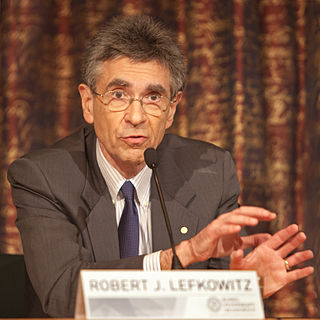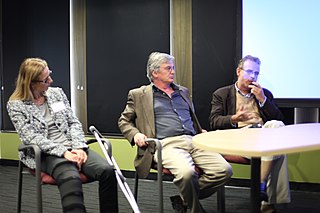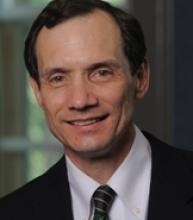
Susan Lee Lindquist, ForMemRS was an American professor of biology at MIT specializing in molecular biology, particularly the protein folding problem within a family of molecules known as heat-shock proteins, and prions. Lindquist was a member and former director of the Whitehead Institute and was awarded the National Medal of Science in 2010.
The University of Maryland School of Medicine, located in Baltimore City, Maryland, U.S., is the medical school of the University of Maryland, Baltimore and is affiliated with the University of Maryland Medical Center and Medical System. Established in 1807 as the College of Medicine of Maryland, it is the first public and the fifth oldest medical school in the United States. UMB SOM's campus includes Davidge Hall, which was built in 1812, and is the oldest building in continuous use for medical education in the Northern Hemisphere.

Paul Adriaan Jan, Baron Janssen was a Belgian physician. He was the founder of Janssen Pharmaceutica, a pharmaceutical company with over 20,000 employees which is now a subsidiary of Johnson & Johnson.

Robert Joseph Lefkowitz is an American physician and biochemist. He is best known for his groundbreaking discoveries that reveal the inner workings of an important family G protein-coupled receptors, for which he was awarded the 2012 Nobel Prize for Chemistry with Brian Kobilka. He is currently an Investigator with the Howard Hughes Medical Institute as well as a James B. Duke Professor of Medicine and Professor of Biochemistry and Chemistry at Duke University.

Arthur L. Horwich is an American biologist and Sterling Professor of Genetics and Pediatrics at the Yale School of Medicine. Horwich has also been a Howard Hughes Medical Institute investigator since 1990. His research into protein folding uncovered the action of chaperonins, protein complexes that assist the folding of other proteins; Horwich first published this work in 1989.
Sir Marc Feldmann,, is an Australian-educated British immunologist. He is a professor at the University of Oxford and a senior research fellow at Somerville College, Oxford.

Napoleone Ferrara, is an Italian-American molecular biologist who joined University of California, San Diego Moores Cancer Center in 2013 after a career in Northern California at the biotechnology giant Genentech, where he pioneered the development of new treatments for angiogenic diseases such as cancer, age-related macular degeneration (AMD), and diabetic retinopathy. At Genentech, he discovered VEGF—and made the first anti-VEGF antibody—which suppresses growth of a variety of tumors. These findings helped lead to development of the first clinically available angiogenesis inhibitor, bevacizumab (Avastin), which prevents the growth of new blood vessels into a solid tumor and which has become part of standard treatment for a variety of cancers. Ferrara's work led also to the development of ranibizumab (Lucentis), a drug that is highly effective at preventing vision loss in intraocular neovascular disorders.
The Wiley Prize in Biomedical Sciences is intended to recognize breakthrough research in pure or applied life science research that is distinguished by its excellence, originality and impact on our understanding of biological systems and processes. The award may recognize a specific contribution or series of contributions that demonstrate the nominee's significant leadership in the development of research concepts or their clinical application. Particular emphasis will be placed on research that champions novel approaches and challenges accepted thinking in the biomedical sciences.

The University of Utah School of Medicine is located on the upper campus of the University of Utah in Salt Lake City, Utah. It was founded in 1905 and is currently the only MD-granting medical school in the state of Utah.

George Quentin Daley is the Dean of the Faculty of Medicine, Caroline Shields Walker Professor of Medicine, and Professor of Biological Chemistry and Molecular Pharmacology at Harvard Medical School. He was formerly the Robert A. Stranahan Professor of Pediatrics at Harvard Medical School, Director of the Stem Cell Transplantation Program at Boston Children's Hospital, and an investigator of the Howard Hughes Medical Institute, Associate Director of Children's Stem Cell Program, a member of the Executive Committee of the Harvard Stem Cell Institute. He is a past president of the International Society for Stem Cell Research (2007–2008).

Eric Newell Olson is an American molecular biologist. He is professor and chair of the Department of Molecular Biology at the University of Texas Southwestern Medical Center in Dallas, where he also holds the Robert A. Welch Distinguished Chair in Science, the Annie and Willie Nelson Professorship in Stem Cell Research, and the Pogue Distinguished Chair in Research on Cardiac Birth Defects.

James Patrick Allison is an American immunologist and Nobel laureate who holds the position of professor and chair of immunology and executive director of immunotherapy platform at the MD Anderson Cancer Center at the University of Texas.

Douglas Cecil Wallace is a geneticist and evolutionary biologist at the University of Pennsylvania and the Children's Hospital of Philadelphia in Pennsylvania. He pioneered the use of human mitochondrial DNA as a molecular marker.
The Max Delbrück Medal has been awarded annually from 1992 to 2013 by the Max Delbrück Center for Molecular Medicine. Named after the German biophysicist Max Delbrück, it is presented in Berlin to an outstanding scientist on the occasion of the annual "Berlin Lecture on Molecular Medicine", which the MDC organizes together with other Berlin research institutions and Bayer HealthCare. The award recipient usually delivers a lecture after the award.

Akiko Iwasaki is a Sterling Professor of Immunobiology and Molecular, Cellular and Developmental Biology at Yale University. She is also a principal investigator at the Howard Hughes Medical Institute. Her research interests include innate immunity, autophagy, inflammasomes, sexually transmitted infections, herpes simplex virus, human papillomavirus, respiratory virus infections, influenza infection, T cell immunity, commensal bacteria, COVID-19 and Long COVID.
Lorenzo Galluzzi is an Italian and French cell biologist best known for his experimental and conceptual contributions to the fields of cell death, autophagy, tumor metabolism and tumor immunology.

Lim Kah Leong, is a Singaporean neuroscientist and tenured full Professor and Vice Dean (Research) at the Lee Kong Chian School of Medicine, Nanyang Technological University (Singapore), where he is also a President's Chair Professor in Translational Neuroscience. He is concurrently the Research Director for Biomedical and Life Sciences at NTU. He was previously Chair of the Department of Physiology at the National University of Singapore, Singapore and the deputy director for research at the National Neuroscience Institute, Singapore. Dr. Lim is known for his research in Parkinson's Disease. His research focuses on unraveling the molecular mechanisms underlying neurodegenerative diseases, with the view to develop novel therapies aimed at effectively treating the disease.
Arnold B. Rabson is an American physician-scientist. He is the director of the Child Health Institute of New Jersey and the Laura Gallagher Chair of Developmental Biology at Robert Wood Johnson Medical School. Rabson is a Fellow of the American Association for the Advancement of Science.

Dr. Michael J. Lenardo, is the chief of the Molecular Development and Immune System Section and the founder and co-Director of the Clinical Genomics Program at the National Institute of Allergy and Infectious Disease (NIAID), National Institutes of Health (NIH). Trained as a geneticist, molecular biologist, and immunologist, his research examines how cells of the immune system defend themselves against various pathogens, including viruses and bacteria. His research has investigated genetic abnormalities in the immune system, mechanisms of cell death, genetic diseases of immune homeostasis and autoimmunity, and development of novel diagnostics and therapeutics for diseases of the immune system. Lenardo's contributions to science and medicine have shown the possibilities of genomic research in developing precision medicine diagnoses and treatments for disease in humans. In 2006 he was appointed Officer of the Most Excellent Order of the British Empire (O.B.E.) by Queen Elizabeth II. In 2019 he was inducted into the National Academies of Sciences and the National Academy of Medicine, considered among the highest honors awarded to a U.S scientist and medical researcher respectively.
Sun Hur is a South Korean-born scientist. She is an Oscar M. Schloss Professor at Harvard Medical School and Boston Children's Hospital and an investigator in the Howard Hughes Medical Institute.













